Tokyo's Disappearing Shotengai
One in an Occasional Look at Japan's Economy
I stood at the top step of the flight of stairs. The sun was rising a lot slower than usual this morning. Or maybe it just always seems that way when the mercury is straddling freezing and I've spent the night out on assignment.
The wind blew trash and the girls grabbed taxis. I turned and moved out from under the now fading pink lights of my second favorite hostess bar in Kabukicho and started down the street, back towards the newsroom with my hands firmly planted in my jacket pockets. It was there that I came upon an old friend - my lighter.
Near a convenience store I stopped and cracked a smile at the strange fortune now resting in my palm. Quite literally in fact since the skin used in that process had not seen any activity since I stumbled across junior reporter Junko's "Dear John" letter to her boyfriend two weeks prior. You'd be surprised what you can stumble across when you open somebody's desk drawer.
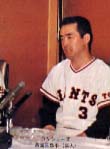 Remembering I was near out (even in the competition with a half dozen slugs of sake, priorities still can float to the top of the memory file), and not wanting to disrupt the serendipity of the moment, I stepped inside.
Remembering I was near out (even in the competition with a half dozen slugs of sake, priorities still can float to the top of the memory file), and not wanting to disrupt the serendipity of the moment, I stepped inside.
"Two packs of Caster Select, my good man," I asked the lone cashier.
He just stared at me, keeping a stern look and not moving. "Cat got your arms? What's going on?" I demanded.
I looked closer. He was none other than Shigeo Nagashima, manager of the Yomiuri Giants, sans warm up jacket and cap. He untied his stained smock and stepped from behind the counter.
Japan's favorite son then shook his finger at me and said, "You think you can just walk into this heartless parlor of convenience demanding nicotine relief while small mom-and-pop shops all around this country are going under? Have you no concern for the Japanese shotengai?"
"What are you talking about?" I asked in a tone acknowledging the presence of the emperor of dugout and vitamin drinks.
He then headed out the door I came in like a liner up the middle. I followed but only after grabbing two packs from the rack behind the register and flipping enough change onto the counter.
Easily distinguishable by stained, dirty, and corroded two-colored awnings over their sidewalks, Japanese shotengai are shopping streets where small family-owned shops supply the local community with such essentials as fruit, vegetables, dry goods, fish, medicine, and alcohol. The stores and their employees are usually ancient, the atmosphere is friendly, good service is the rule, and the customer is always king. But these days the steel security shutter is becoming a more common characteristic than stacked crates of oranges, dried sardines, and nuts.
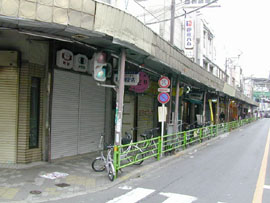 "These
convenience stores, fast
food chains, and large supermarkets," the skipper
began from our new location across from the entrance of the
Nissin World Delicatessen in the Higashi Azabu area of Tokyo,
"have nothing in the way of character, charm, or even
friendly service to offer the customer. This scene is being
repeated all across this city." Under the watchful eye
of Tokyo Tower, he pointed down the street running perpendicular
to the market at a few of the now-shuttered small shops.
"These
convenience stores, fast
food chains, and large supermarkets," the skipper
began from our new location across from the entrance of the
Nissin World Delicatessen in the Higashi Azabu area of Tokyo,
"have nothing in the way of character, charm, or even
friendly service to offer the customer. This scene is being
repeated all across this city." Under the watchful eye
of Tokyo Tower, he pointed down the street running perpendicular
to the market at a few of the now-shuttered small shops.
Ten years ago Japan deregulated certain business operations, allowing large stores to bypass licenses and permits that were once a stumbling block to providing Japanese citizens with cheap access to such necessities as toothpaste and coffee. Now convenience stores and such large markets as Jusco and Daiei are providing competition and lower prices, rendering happiness up and down the Japanese lineup; the salarymen can get their booze, the women their cosmetics, and the kids their candy. Everyone, that is, except the bloodletting shotengai employees.
After crossing the street and entering the hulking three-year old international food emporium, I asked Nagashima, "I see cheese, bagels, fruit, and meat, what else could you want?"
"The old shotengai shops take pride in their tradition of giving the customer the best service. Take for example," he offered, "Ueno's Ameyoko Shotengai. Oftentimes you will hear, 'Irashai irashai, okyaku-san, shukketsu daisaabisu dayo, yasuku suruyo!' as you walk past the screaming fish and vegetable vendors."
"You mean..." I started.
"Yep, the workers are prepared to spill blood right in front of you to give the lowest price. Is a Don Quixote shop or this place gonna do the same?" He spread his arms apart in capitulation. He's probably right, not even in the meat section.
But a Don Quixote discount shop in Suginami Ward was almost barred from opening business for fear, amongst other things, that some customers might do a little blood spilling of their own with some of the store's products. The New York Times reports, "Neighborhood residents and local merchants united last year and gathered 6,271 signatures in their campaign to keep Don Quixote out. The group argued that the store would increase traffic and worsen pollution. They said some merchandise - in particular, sexually explicit toys and videos, as well as knives - would end up in the hands of youngsters."
But rather than a fear of a few slashed teenagers, the Times continues, the more likely impetus for the move was a fear of the unkindest cut of all - cut-rate prices. So then some communities aren't relinquishing their hold to the giants. They're bringing in their best reliever when the game gets tight. But in this case, was it necessary?
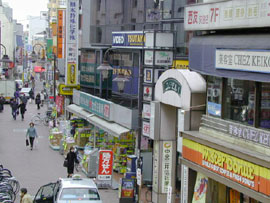 After a few concessions were made as to the store's operating hours and stock and after the local government passed legislation restricting store size in the area (seemingly reestablishing regulations previously abolished), the store still opened with sales well above expectations. The opposition were pleased with the results, insinuating that they perhaps overreacted. But, says the Times, "They still watch the store, patrolling the parking lot between 10 p.m. and 11 p.m. and making spot checks of the merchandise."
After a few concessions were made as to the store's operating hours and stock and after the local government passed legislation restricting store size in the area (seemingly reestablishing regulations previously abolished), the store still opened with sales well above expectations. The opposition were pleased with the results, insinuating that they perhaps overreacted. But, says the Times, "They still watch the store, patrolling the parking lot between 10 p.m. and 11 p.m. and making spot checks of the merchandise."
Other than resorting to military-type tactics to reinvent Japanese capitalism, is it possible for the locals and the invading newbies to play nice? Near Kichijoji Station, Nagashima showed me where at the Sun Road shotengai the small shops are neither giving up nor engaging in combat - they are working together with the new kids on the block.
"You see the small stores here selling their wares right in the proximity of these chains?" he pointed inside. I nodded and we moved inside the tile-floored and arching dome-covered space.
The small family-run fish, sweets, and rice shops are mainly contained within a maze of small alleys and paths behind the colorful and well-maintained thoroughfare. Though in a less than opportune space they are nonetheless managing to stay afloat by catering to individuals seeking service and fresh products, while their big brothers out front sell clothes, fast food, handbags, film, and coffee to consumers solely in search of appealing prices and convenience.
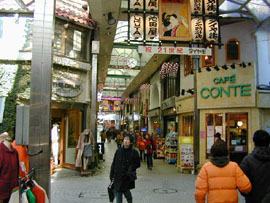 I unfurled the plastic on one of the fresh packs while we stood in the darkened maze and observed some regulars chatting with the shopkeepers. "So," I asked while retrieving a single, "Why aren't you getting the Giants ready for this year's title defense right now?" I lit my first smoke of the day.
I unfurled the plastic on one of the fresh packs while we stood in the darkened maze and observed some regulars chatting with the shopkeepers. "So," I asked while retrieving a single, "Why aren't you getting the Giants ready for this year's title defense right now?" I lit my first smoke of the day.
"Oh Christ," he complained, "so I can watch Matsui go through warm ups in front of the media? This convenience store gig is fine until we go to Guam for spring practice. I'll get my share of that garbage then." He started to flash me the sign to sacrifice him a cigarette but instead paused and started walking back to the station.
"I just remembered one more unique story in all this," he said as we boarded a train back to the center of the city.
In Akebonobashi we peered inside the windows of the now closed Natsumi Store. Within sniffing distance of the fumes emanating from the Dai Nippon Printing factory and along a heavily trafficked street, this former small household products, candy, and ice cream store is a literal pop culture museum from the 1980s.
Stepping back and observing the store from across the street Nagashima said, "This isn't a shotengai area exactly but this is a symptom of the same principle. Back about 15 years ago, some stores foresaw the changes required in operating small businesses and decided to pack it in. The writing was on the wall and they moved on to greener pastures." Perhaps writing or, in this case, maybe the abhorrent fashion statements on display in the Coca-Cola posters taped in the windows.
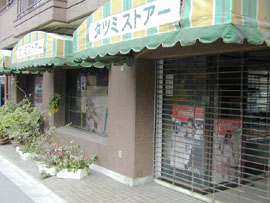 The store's shelves remain stocked with coffee, toothbrushes, candy, and shampoo. Ice cream coolers and cash registers sit idly by, patiently waiting to serve.
The store's shelves remain stocked with coffee, toothbrushes, candy, and shampoo. Ice cream coolers and cash registers sit idly by, patiently waiting to serve.
Nagashima pointed to a handwritten sign in the window that is still cautioning customers on where to park their bicycles. "Rumor has it," he said, "that the owners just decided to abandon the store. Open one day and closed the next. It was during the bubble days and they wanted to focus on renting the apartments above the store."
I pulled out another smoke and began to roll the wheel of my lighter in deep thought while standing under the store's awning. "So if you walked into a men's room and saw Hanshin's Nomura at the urinal, would you punch him before or after..."
I looked up and Nagashima was gone. I took that to mean spring practice will be getting underway shortly. I lit the smoke and blew three strikes into the air.

